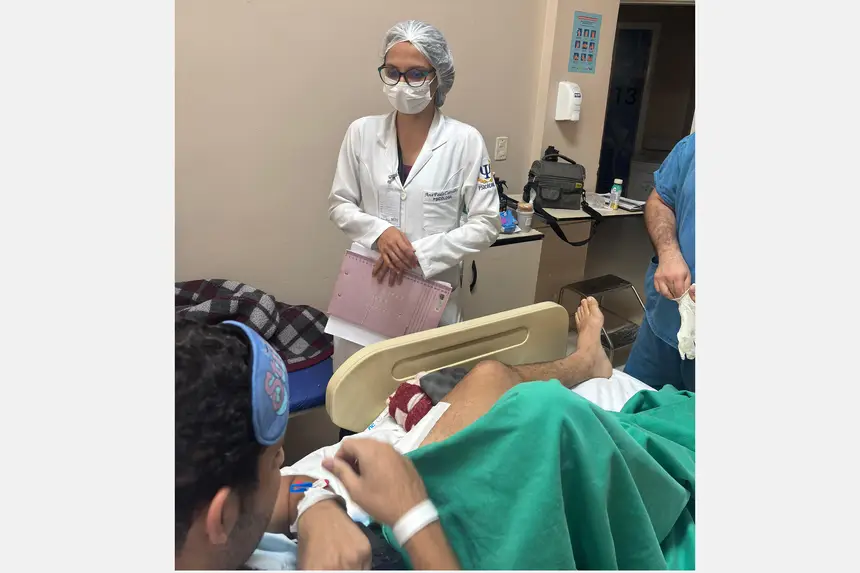Galileu Hospital addresses the emotional impacts of severe accidents
Psychologist discusses the emotional challenges faced by patients recovering from physical trauma and the importance of psychological support in this process

Psychological care plays a fundamental role in the recovery process of trauma victims, especially after severe accidents. At the Galileu State Public Hospital, located in Greater Belém, which is a reference in trauma care in the State of Pará, patients receive not only the necessary physical care but also integrated psychological support as part of their rehabilitation.
Psychologist Ana Paula Carvalho, who is part of the unit's team, explains how emotional suffering is addressed and the various stages of psychological support to ensure the complete recovery of patients.
According to the professional, any accident can be considered traumatic in psychological terms, varying according to the severity of the event and the patient's prior emotional condition. "Symptoms of post-traumatic stress, anxiety, and depressive symptoms are the most common after a severe accident. These issues can profoundly affect the patient's well-being and recovery," she states.
Signs - Ana Paula highlights that the main sign that physical trauma is accompanied by emotional suffering is the patient's functional impairment. "Mood changes, sleep disturbances, loss of appetite, resistance to understanding their clinical condition, and difficulties in bonding with the medical team are some of the main signs. The patient may become sensitive to pain and have difficulties accepting treatment, which directly impacts the recovery process," she explains.
Integration - At Galileu Hospital, psychological care is effectively integrated into the physical rehabilitation process, focusing on the biopsychosocial dimensions of health. "From admission, we conduct a Situational Psychological Assessment, which serves as the basis for constructing the patient's Therapeutic Plan. This assessment considers the patient's emotional state, their mood regarding the clinical picture, and their internal resources to face treatment," the psychologist clarifies.
Emotional support begins immediately after the patient's admission. Ana Paula explains that, although there is a standard approach for all patients, which includes an initial assessment form and an ethical welcoming posture, the management may vary according to the case's needs. "In situations of extreme vulnerability, such as victims of attempted femicide, the approach is even more sensitive to avoid re-victimization of the patient," she emphasizes.
Fear of not resuming routine and the role of psychological support
Many patients, after severe accidents, face the fear of not being able to resume their routines, such as returning to work or performing daily activities. The psychologist explains that these feelings are addressed with much support and clear guidance. "We respect the patient's psychological timing and provide guidance on their clinical picture and treatment. It is common for the mind not to keep pace with the physical recovery, and this requires sensitivity to deal with the emotional challenges the patient faces outside the hospital, such as family and professional issues," comments Ana Paula.
The psychologist emphasizes that the presence of the family in the recovery process is essential. "The family plays a strategic role in supporting the patient. In addition to providing comfort, they can observe and provide important information for psychological follow-up. We also offer psychoeducational guidance and emotional support for family members so they can better cope with the situation," she explains.
Hospital discharge - In cases of more severe trauma, emotional suffering may continue even after medical discharge. Ana Paula notes that, in many situations, emotional trauma does not resolve with physical recovery. "Some patients present persistent emotional symptoms, which can evolve into mental disorders or worsen pre-existing conditions. In these cases, we provide guidance on the Psychosocial Network and make referrals to health services as needed," she clarifies.
To conclude, the psychologist advises: "The first step is to recognize that you need help. Emotional issues are not related to weakness or lack of faith. Seeking mental health support is essential to understand the difficult moment being experienced. There are qualified professionals in public health services ready to help navigate this process in a more welcoming and healthy way," Ana Paula concludes.
Profile - Galileu Hospital is a unit belonging to the Government of Pará, managed by the Institute of Social and Environmental Health of the Amazon (ISSAA), in partnership with the State Department of Public Health (Sespa). To access the unit, the patient must be referred through State Regulation; therefore, the services are not walk-in.
Text: Roberta Paraense









